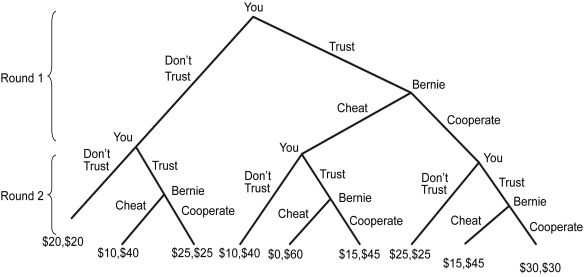Recall the trust game reported in the Evidence-Based Economics element in section 13.5.Consider the game where the trust game is played twice in succession.

Payoffs are the sum of payoff in each round.For example,suppose you choose Trust and Bernie chooses Cheat in the first round,then you choose Don't Trust in the second round (Bernie could choose either,because it does not get to his turn anyway).Then you earn $0 and Bernie earns $30 in the first round,and you earn $10 and Bernie earns $10 in the second round,so that your total payoff is $10 and Bernie's is $40.
a)Apply backward induction to this game.How do you and Bernie behave in the two-round version?
b)What would be the backward induction solution if the trust game is repeated three times? Four times? Twenty thousand times? Does this agree with what you read in the Evidence-Based Economics element in section 13.5?
Correct Answer:
Verified
View Answer
Unlock this answer now
Get Access to more Verified Answers free of charge
Q189: Two rival cosmetics brands are considering launching
Q190: Sam Walton chose a very different strategy
Q191: Scenario: Alex puts $100 on the table.
Q192: Scenario: Consider a trust game between an
Q193: John and Jacob are participating in a
Q194: What does the term "commitment" refer to
Q195: Scenario: Consider a trust game between an
Q196: When does a game have a first-mover
Q197: The following figure depicts four sequential games.
Q199: The following figure depicts four sequential games.
Unlock this Answer For Free Now!
View this answer and more for free by performing one of the following actions

Scan the QR code to install the App and get 2 free unlocks

Unlock quizzes for free by uploading documents